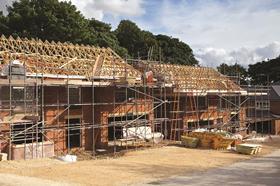Lyons’ support for garden cities and greenfield development hailed as a “necessary response to the housing crisis”

The UK construction industry has given a cautious welcome to the Lyons review calling it a “positive step” in solving the current housing crisis - even though the review recommends building on green belt land.
The long-awaited review, which was published by Labour today, has given priority to solving the UK’s housing needs by designating new “housing growth areas” that would have their development fast-tracked.
Labour has committed to putting the recommendations in the review into official policy, and has pledged to build 200,000 homes a year by the end of the decade.
Sir Michael Lyon’s who conducted the review has also called for provision of financial incentives to local authorities to encourage them to deliver a programme of new Garden Cities and Garden Suburbs providing 500,000 homes.
Matt Thomson, head of planning for the Campaign to Protect Rural England (CPRE), welcomed an “even handed and proportionate approach”.
He said: “In particular, we welcome the recommendations on returning to and strengthening the ‘brownfield first’ policy and sequential approaches to identifying housing land.
“We’re also pleased to see the focus on increasing the role that the public sector and smaller, independent house-builders can, and should, make to meeting housing needs, and support the idea of applying a spatial dimension to national planning policy to account for geographical differences and opportunities.
“As usual with these things, the devil will be in the detail - for example the details of the future for our green belt are currently inconsistent.”
Chair of planning at property agent CBRE Stuart Robinson said it was surprising that Garden Cities were given such strong support in the review. He said: “Rather surprisingly there seems to be a unanimous support for the Garden Cities approach to greenfield development as a necessary response to the housing crisis in the country with all three parties now making proposals for specific areas of the country. What is new in Lyons is the commitment to explore financial incentives to establish these initiatives.”
The Chartered Institute for Housing, who was a member of the Lyons commission which produced the review, said the report was a “blueprint for action” and hailed it as the most comprehensive approach for a decade.
David Orr, chief executive of the National Housing Federation, who was also on the Lyons panel said: “I welcome the ideas that would see us build 200,000 new homes by 2020 and the ambition to go beyond this to meet demand.
“We’re pleased that the ideas we’ve put forward to all the parties ahead of the general election have been listened to, such as access and control over how land is used. We are calling on the next government to commit to end the housing crisis within a generation and to publish a long term plan within a year of taking office detailing how they will do this.”
The Home Builders Federation welcomed the report’s plan to help first time buyers. Stewart Baseley, executive chair of the Home Builders Federation, said: “Policies that would result in more land coming forward for development more quickly and further assist first time buyers would clearly provide a boost to housing supply.


























No comments yet